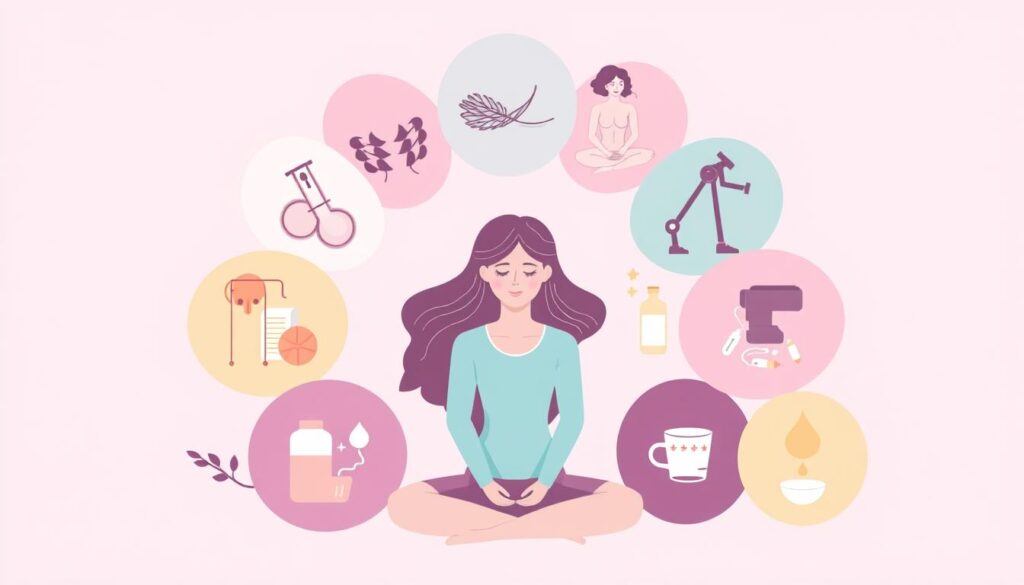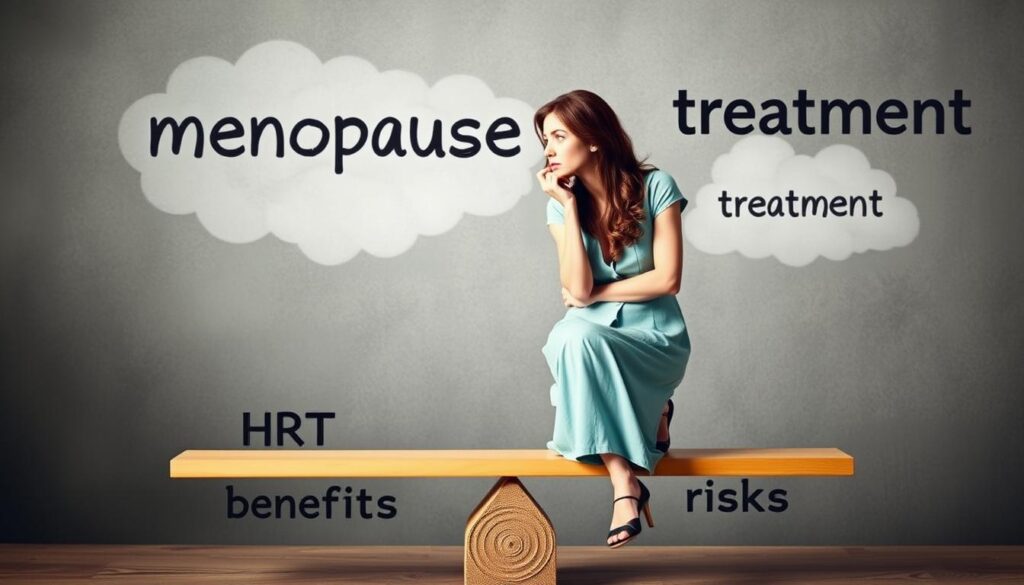Are you tired of dealing with hot flashes, night sweats and mood swings during menopause? This natural change can be tough but finding the right treatment can help. We’ll share the best ways to handle menopause symptoms, based on expert advice.
Key Takeaways
- Understand the hormonal changes during menopause and the role of tests in diagnosis
- Explore the most effective treatments, including hormone replacement therapy HRT and natural remedies
- Discover the benefits and potential risks associated with HRT
- Learn about lifestyle modifications and alternative therapies that can complement your treatment plan
- Find out how to build an individualized approach to address your unique menopause experience
Diagnosis of Menopause
Symptoms and Tests
Many women notice menopause coming with symptoms like irregular periods, hot flashes, and mood swings. Doctors might suggest tests to confirm it. These tests check FSH and estrogen levels which change during the menopausal transition. They also look at thyroid stimulating hormone TSH to check for an overactive thyroid which can mimic menopause symptoms.
Home FSH tests are out there, but they’re not always reliable because of the hormone changes in perimenopause. Doctors do blood tests to get a clear picture of FSH and estrogen levels. This helps confirm if you’re entering menopause.
| Test | Purpose |
|---|---|
| Follicle-Stimulating Hormone FSH Test | Measures levels of FSH, which increase during menopause as the ovaries produce less estrogen. |
| Estrogen Test | Measures levels of estrogen, which decrease during menopause as the ovaries produce less of this hormone. |
| Thyroid-Stimulating Hormone TSH Test | Checks for an overactive thyroid, which can cause symptoms similar to menopause. |

Doctors usually diagnose menopause by looking at a woman’s age, health history, and symptoms. But these tests can give more details. They help rule out other health issues.
What is the Best Treatment for Menopause?
Finding the right treatment for menopause can be complex, with options like hormone therapy, lifestyle changes, and alternative methods. The main aim is to ease symptoms, manage related health issues, and boost overall health and happiness.
Hormone replacement therapy HRT is a top choice for menopause. It helps with symptoms like hot flashes, night sweats, brain fog, and vaginal dryness. HRT also keeps bones strong and lowers the risk of osteoporosis and heart disease.
For those who can’t or don’t want HRT, there are other ways to help. Non-hormonal medications can ease specific symptoms, like hot flashes or mood changes. Lifestyle modifications, like exercise, stress management, and diet, can also help.
Some people look into complementary and alternative therapies, like herbal remedies, acupuncture, and bioidentical hormones. But, their safety and effectiveness are not as proven as traditional treatments.
The best menopause treatment is very personal. It depends on a person’s symptoms, health history, and what they prefer. Doctors work with patients to create a plan that meets their specific needs and concerns.

The key to managing menopause is finding the right balance between relieving symptoms and minimizing risks. With the guidance of a healthcare provider, women can explore the full range of treatment options and develop a plan that works best for them.
Hormone Therapy HRT
Types and Delivery Methods
Hormone therapy, also known as hormone replacement therapy HRT, is a top treatment for menopause symptoms. It mainly uses estrogen, which comes in forms like pills, patches, gels, creams, tablets, or rings. Women with a uterus also need progestin added to lower the risk of uterine cancer. Bioidentical hormones, which match the body’s natural hormones, are another choice.
Doctors help patients pick the right type and way to take hormone replacement therapy based on their needs and likes. Deciding on HRT should be done with a doctor, considering the pros and cons.
| Hormone Therapy Type | Delivery Methods |
|---|---|
| Estrogen Therapy |
|
| Combination Therapy Estrogen and Progestin |
|
| Bioidentical Hormones |
|
Hormone therapy HT and hormone replacement therapy HRT are often used the same way, but there are small differences. Doctors might use different names depending on the patient’s age and condition.

Benefits and Risks of HRT
Hormone replacement therapy HRT helps manage menopause symptoms like hot flashes and bone loss. But, it also has risks that need careful thought from women and their doctors.
HRT has many benefits. Studies show it helps with hot flashes, vaginal dryness, night sweats, and bone loss. It’s mainly used for these symptoms and to prevent osteoporosis.
| HRT Benefits | HRT Risks |
|---|---|
| Reduces hot flashes and night sweats | Increased risk of heart disease, stroke, and blood clots |
| Improves vaginal dryness and sexual function | Increased risk of certain types of cancer, such as breast cancer |
| Slows bone loss and reduces risk of osteoporosis | Potential effects on conditions like dementia and diabetes |
But, HRT also has risks. The FDA and Health Canada warn about its dangers, including heart disease, stroke, and some cancers. Most breast cancer risk is linked to estrogen plus progestogen therapy EPT.
The risks and benefits of HRT depend on your age, menopause time, and health. Doctors can help patients decide if HRT is right for them.

If under 60 years old, with menopause symptoms and not at high risk of breast cancer or blood clots, benefits of HRT likely outweigh the risks.
Lifestyle and Home Remedies
Medical treatments help with menopausal symptoms, but lifestyle changes and home remedies are key too. They can help manage hot flashes and vaginal dryness. A holistic approach makes the transition smoother.
Hot Flashes and Night Sweats
- Dress in lightweight, breathable layers that can be easily adjusted
- Use fans or air conditioning to stay cool
- Avoid triggers like caffeine, alcohol, and spicy foods
- Practice relaxation techniques like deep breathing and meditation
Vaginal Dryness
- Use over-the-counter water-based lubricants or moisturizers
- Maintain good vaginal hygiene and avoid harsh soaps or douching
- Try topical vitamin E oil to improve lubrication
Sleep and Stress Management
- Establish a consistent sleep routine and limit screen time before bed
- Engage in regular exercise, such as yoga or walking, to reduce stress and improve sleep quality
- Practice relaxation techniques, like deep breathing or meditation, to manage anxiety and irritability
Dietary and Nutritional Considerations
- Incorporate soy-based foods, like tofu and edamame, which may help alleviate hot flashes
- Ensure adequate intake of calcium, vitamin D, and other nutrients to maintain bone health
- Stay hydrated by drinking plenty of water throughout the day
Natural supplements like black cohosh or flaxseed may help with menopause symptoms, but results vary. Adding these lifestyle and home remedies offers a holistic way to tackle the challenges of menopause. Always talk to a healthcare provider before changing your diet or treatment plan.

Alternative Therapies
Traditional hormone therapy HT is the top choice for easing menopause symptoms. Yet, some women look into other options. These include phytoestrogens and bioidentical hormones from natural sources. But, these alternatives aren’t as proven as HT and can have risks.
Phytoestrogens and Bioidentical Hormones
Phytoestrogens come from foods like soy and flaxseed and have a weak estrogen effect. Bioidentical hormones are made from plants and match the body’s hormones exactly. Some women find these alternatives helpful, but their long term safety and effectiveness are still being studied.
If you’re thinking about these therapies, talk to your doctor. They can tell you if they’re right for you and how they might affect other medicines you take.
| Alternative Therapy | Potential Benefits | Safety Concerns |
|---|---|---|
| Phytoestrogens e.g., soy, flaxseed | May have a mild estrogenic effect and help alleviate hot flashes and other menopausal symptoms | Limited long-term safety data, potential interactions with certain medications |
| Bioidentical Hormones | Chemically identical to the body’s natural hormones, may be better tolerated by some women | Quality and safety can vary between different brands, potential risks similar to conventional HT |
| Herbal Supplements e.g., black cohosh, ginseng, dong quai | Some studies suggest potential benefits for symptom relief, but the evidence is mixed | Lack of regulation, potential for interactions with medications, and uncertain long-term safety |
While alternative therapies may help with menopause symptoms, they might not work as well as HT. Always talk to your doctor to find the best treatment for you, considering your health and history.
Mind Body Approaches
Women going through menopause often find that their mental and emotional health is as important as their physical health. Techniques like cognitive behavioral therapy, yoga, and hypnosis help lessen hot flashes and mood swings. These methods are shown to be effective.
They help women cope better, sleep better, and feel better overall. By focusing on the mind-body connection, women can better understand and manage the emotional and mental changes of menopause and mental health.
Cognitive Behavioral Therapy
Cognitive behavioral therapy CBT is great for dealing with menopause’s mental side effects. It helps women change negative thoughts into better coping strategies. Studies show CBT can cut down on hot flashes and make mood and sleep better.
Yoga and Relaxation Techniques
- Doing yoga can help manage stress, sleep better, and ease symptoms like hot flashes and mood changes.
- Hypnosis and other relaxation techniques, like deep breathing and muscle relaxation, also help lessen menopause symptoms and boost well-being.
Adding these mind-body methods to their daily routine can help women handle the emotional and mental ups and downs of menopause. This can make their life better during this big change.
Holistic approaches emphasize the importance of nurturing the mind body connection during menopause.
Considerations for HRT
Hormone replacement therapy HRT can help with menopause symptoms, but it’s important to think about the risks and side effects. HRT might raise the risk of serious issues like blood clots, breast cancer, heart disease, and stroke. This is true for women with a past history of these conditions or those starting HRT later in life.
Side effects of HRT include bloating, breast tenderness, headaches, and mood changes. Doctors are key in helping patients understand the pros and cons of HRT. They look at each patient’s medical history and what they prefer.
Risks and Side Effects
- Increased risk of blood clots
- Heightened chances of breast cancer
- Elevated risk of heart disease
- Increased likelihood of stroke
- Bloating, breast tenderness, headaches, and mood changes
Talking openly with doctors is crucial to find the right way to manage menopause symptoms and avoid health risks. By looking at the facts and making informed choices, women can pick the best HRT for their needs and worries.
Individualized Treatment Plan
Dealing with menopause needs a plan made just for you. It’s not the same for everyone. Working together with your healthcare provider is key. They look at your symptoms, health history, age, and what you prefer. This way, they can make a treatment plan just for you.
Through shared decision-making, you can work with your healthcare team. You can look at different personalized menopause treatment options. This might include hormone therapy, changing your lifestyle, trying new therapies, or a mix of these. They’ll think about what’s best for you, considering your risks, benefits, and worries.
Your menopause journey is unique, and a personalized treatment plan lets you take charge of your health. By talking openly and working together with healthcare provider collaboration, you can move through this change with confidence. You’ll find the best ways to meet your needs.
Choosing a personalized way to handle menopause can bring relief and help you feel in control. It’s important to work with trusted healthcare providers. They’ll help you look at your options and make choices that fit your life and goals. With this approach, going through menopause can be easier.
Conclusion
As we go through menopause, finding the right way to manage it, ease symptoms, and improve life quality becomes clear. Women can work with their doctors to find the best treatment for them. This might include hormone therapy, changing their lifestyle, or trying other methods.
Menopause can be tough, but with the right advice and knowledge, women can get through it feeling strong. By getting a plan that fits just for them, women can handle their symptoms and keep their health up. This way, they can start a new chapter of their lives feeling full of energy and well.
It’s important to keep learning, talk openly with doctors, and try different treatments. This helps women go through menopause smoothly, reduce symptoms, and enjoy a better quality of life during this big change.





